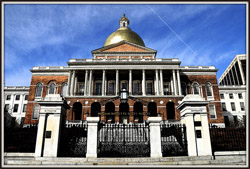By
on

An interesting article earlier this week on Boston.com says a number of Massachusetts towns are studying muni electric plants after the privately owned electrical company took too long restoring power in the aftermath of Hurricane Irene.

“We are at the very beginning. We want to see if municipal control is even possible,’’ said Norwell Town Administrator James Boudreau. “We want a faster response. This was a tropical storm. What if it was a category 2 hurricane? What if it was the winter?’’ he said, noting the efficient restoration of power in towns with electric utilities under municipal control, such as Hingham, Hull, and Braintree.Braintree's municiple utility also runs a broadband network for the community. If these communities are looking at am uni utility, they should ceratinly consider improving their broadband access at the same time. As we have covered previously, Wired West (on the other side of the state) is a collection of many communities that recently formed municipal "light plants" (in the parlance of Massachuesetts) as a legal structure for building a community fiber network. As we have observed time and time again, local control tends to improve the quality and response time of customer service. And in those cases where it doesn't, at least they have no one to blame but themselves. It is well within their power to fix it. Curiously, National Grid was formed by combining privatized former muni electric utilities -- a warning to communities that may look to privatize their community broadband networks over time due to the mistaken notion that community ownership was only necessary to establish the network rather than ensure it continues operating for the benefit of the community. Community broadband is about far more than technology, it is about ownership by an entity with the right incentives to operate essential infrastructure. The company's response to this movement is fascinating:
National Grid offers a different opinion. Communities are “best served by a company with established practices, resources, and programs that can serve them in an evolving, challenging energy environment,’’ said Deborah Drew, a spokeswoman for the utility.Say what? When presented with the evidence that self-reliant communities responded faster and more effectively, they reiterate that their approach is better. Just like the telco and cableco incumbents, we see the same "just trust us, no matter what the evidence says" mentality. This is not the first strike against National Grid - they were already on the hot seat for their slow response to a winter storm in 2010. The path forward is a hard one.

Over the past few weeks, an array of community officials, legislators, and residents from the area have begun pushing for movement on Beacon Hill, said state Representative Jay Kaufman, a Lexington Democrat responsible for repeatedly filing what is now called bill H869, or the “muni-choice bill.’’ It would grant cities and towns the option, under state authority, to form a municipal utility by making it possible for them to acquire electric wires and other assets at a fair price from the current investor-owned utilities. The passage of such a bill would mark the first step in the multilayered efforts necessary to extract a town from its established reliance on private electric utilities. Change would first require legislative action; then economic and engineering feasibility studies; the accumulation of necessary infrastructure, such as electric wires and poles; securing long-term power supplies; as well as operating and improving the system.But we see the same barriers to re-establishing public power as we do in community broadband -- too much money corrupting the political process:
This year, NStar spent more than $70,000 opposing the municipal utility bill and other legislation; National Grid spent $25,000.Sadly, it does not take a big investment to block good ideas in many state legislatures. Photo of State Capital courtesy of Tony the Misfit on Flickr
Geoterm







